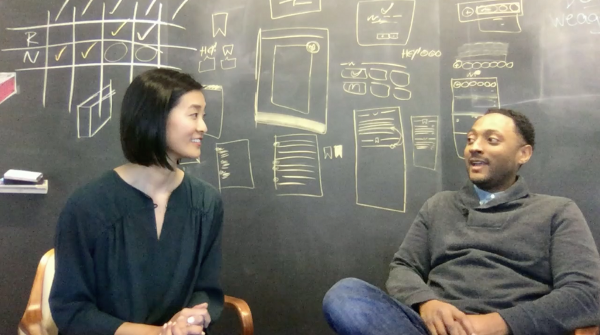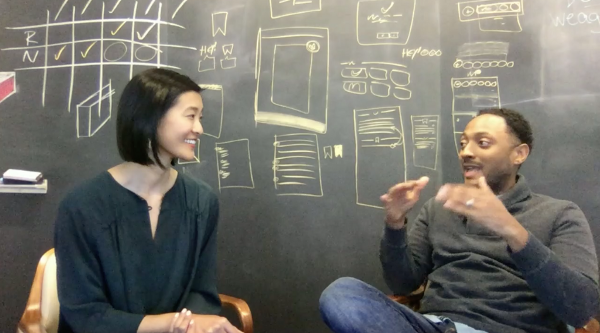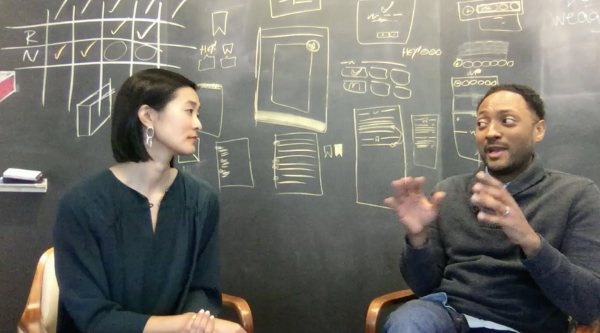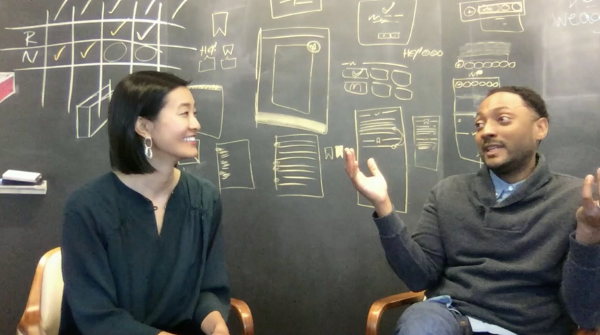An acclaimed nonprofit leader featured on the TODAY show, Steve shares his biggest lessons learned around empathy, self-care, and self-awareness as a leader.
Claire: Hi everyone. I’m Claire Lew, and I’m the CEO of Know Your Company. I am here in Chicago with honestly one of my favorite people in this city. We have Steve Larosiliere, whose name I hopefully pronounced right, even though we are friends…
Steve: Yeah, it’s Larosiliere. Yep, you said it.
Claire: Haha, it’s a hard one. Steve is the founder and president of STOKED, this incredible organization that help teens stay out of trouble through getting them engaged in action sports. Steve most recently, he’s a little famous, He was on the TODAY Show. Whatever Steve.
Steve: It’s my 15 minutes of fame.
Claire: I’m honored to have him here, because Steve, prior to running his own nonprofit — an extremely successful national nonprofit — was in the ad agency world, and you even led your own company there. In terms of leadership, just really excited to be able to talk with you today.
Steve: Thank you. Yeah, I’m excited to be here. Absolutely, I’m a fan of you, so I’m just happy to be here.
Claire: Thanks, man. I’ll take that. Steve, as you know, I’ve been asking this one question to leaders I respect.
Steve: Great.
Claire: Are you ready for it?
Steve: I’m ready.
Claire: Okay. The question is: “what’s something you wish you would have learned earlier as a leader?”

Steve: That’s a good one. Empathy.
Claire: Empathy, okay.
Steve: I feel like early in my career, I didn’t have good leadership role models. I thought leaders just barked orders. If they were the leader, and they had the vision, everybody needed to fall in line. That is completely wrong. I think I’ve developed empathy throughout the years, because I realized that by putting yourself in other people’s shoes, and knowing where they come from, and understanding who they are, their motivations, their drive, their strengths, their weaknesses, their hopes, their fears, if you get that, then you can work with people. Then you can meet people where they are, and so that is the number one thing.
I mean, Gary V talks about empathy a lot. I have another friend named Daniel Epstein. He runs Unreasonable Institute. He has this thing called empathy builds empires. SoulPancake, they talk about empathy. I mean, I knew it intuitively, because especially when you’re sitting down with an employee, or sitting down with somebody that’s on your team … It’s like you have an agenda. You know what the tasks are. You know what your goals are. You’re sitting down for a meeting to just check in, and you see from their body language that things aren’t right. Or you notice that they call in sick, or late, or some unexpected thing happened. Right?
Claire: Yes. I’ve been there before, by the way. I’ve been checked out.
Steve: Yeah, and you can’t ignore it. You have to acknowledge it. I mean, you can just put yourself in that person’s shoes, even for a couple of minutes, acknowledge where they’re coming from, and say, “If there’s anything that I could do to support,” and I think every leader needs to do that. I feel like if you don’t have the time, then delegate that to somebody who has that in their nature.
Claire: No, there’s a lot I want to unpack here, because what you’re talking about is an awareness of more than what sort of meets the eye. That’s what empathy involves. The other thing you’re talking about is that it sounds like in your experience, it doesn’t come naturally to everyone.
Steve: No.
Claire: Right, you were saying if it’s not within your nature, delegate. Talk to me about this. It doesn’t sound like initially in your career that this is something you did.
Steve: For sure, yeah, yeah.
Claire: … so how do you develop this? Actually, how do you get good at being empathetic? Is that a thing?
Steve: No, it took a lot of work. After my first company closed … I was going through the transition, so I had a marketing agency before. Then I ran out for four years, and then I went to the nonprofit field, because I just wanted to do something different. When I decided to start my organization, I realize that in order to be in a position of service, and a position where you can serve people at a greater level, you have to do a lot of inner work yourself. Right?
Claire: Yep.

Steve: I’m sure you know this. You talk about this all the time. It’s just like, leaders need to know themselves, work out their issues, if not, get help for it. A lot of times people, they keep ascending in their career, and they’ve noticed that okay, maybe they got a senior level position in one company, but then that ends, and then they fail up, because of the title that they had before, the thing that they had before.
But the same issue from one job to the next company is still there, just because they haven’t worked it out. So they have to work it out. Honestly, how you have to work it out … I joke, I said this to somebody, I was like, “Oh yeah, you should run butt naked, and run through the desert or something, or through the sweat lodge.”
Claire: All right, everyone taking notes, watching this, go run butt naked through the desert. No, I get what you mean though.
Steve: You know what I mean?
Claire: Yeah.
Steve: You just have to learn the things. I have a mentor. I realized when I check in with him. It’s when things are just a little tough. He calls me out on my stuff.
He talks about how everything stems from something. If you don’t know what your issue stems from, then you can never fully resolve it. It’s like psychology, but it’s really business.
If you have an employee that’s rubbing you the wrong way, if you have a client that doing this, it’s really because A, you didn’t pay attention to the cues. Two, you didn’t set boundaries. Three, you weren’t empathetic. Four, you just didn’t set it up, and you’re bringing past stuff to this new relationship, and you’re never going to be really able to grow. Those are all things that I know for me … He talks about the next level of leadership. Every time I reach a milestone in my business, or in my career, he’s like, “Great, look at where you were three years ago.” So I realize in myself, there’s certain periods, seasons in which I feel overwhelmed, or I feel too busy, or I feel stressed out, or I feel depleted.
He’s like, “Okay, look at three years ago. You felt the same thing, but you didn’t have the accomplishments, and the milestones that you’ve reached now. What’s happening?”
Claire: What’s happening? Yeah.
Steve: I’m like, “Whoa,” and it’s deep. Right?
Claire: Right.
Steve: Because we all as leaders have this sort of innate thing that we need to fill.
Claire: Yeah, we’re chasing something.

Steve: We’re chasing something. Until you’re at peace at that, you’re always going to be chasing something. Whether it’s on your phone, or whether it is obsessively checking email, or obsessively checking LinkedIn for deals, or whatever, you’re always going to be chasing something.
So that’s where empathy comes in. Then in order to get around that … I’m doing my best at this moment to surround myself with the types of people that are leveling up in their lives, in their career, and are empathetic.
Claire: Right.
Steve: Because it can’t just be about numbers, because you hit a goal milestone, sure … It’s not going to help you. I mean, you’re still going to be in the same spot. Or even if you reach it, you’re not going to be happy with it. You’re going to be like, “What, that’s it?”
Claire: Absolutely. I think this lack of self-awareness that you’re talking about around, “What are my own issues?” Think about how that actually trickles down into a team.
Steve: For sure, 100%.
Claire: Because if you feel this restlessness, and this need to keep chasing, but you’re not really sure why, if you have unresolved issues from past employees, or past companies or clients, I think about how that actually bleeds into your interactions with a team. You demand more of your team. You’re more unreasonable with your team. I mean, there’s a fascinating, I don’t know if you saw this, a Harvard Business Review piece that came out very recently, that talked about how managers and a lot of business owners demand 70 hour work weeks from their employees.
Steve: Unreasonable.
Claire: Right, and their employees do it, and actually want to put in more. You know what the study found, is that it’s all based around insecurity. People feeling like they’re not good enough. That we, actually Americans in particular. Because around the world this is not a thing.
Steve: No, not at all.
Claire: I was just in New Zealand, and this anxiety around needing to work more, and to work harder, and grind it out, and hustle, it’s an American thing. It might be a bit of an Asian thing, being Korean myself, and we can talk about that later. But it was a fascinating study around the insecurity of leaders, and the insecurity of our employees, we just say, “Oh, do more. Keep pushing for those numbers. Keep reaching.”
Steve: Yep, and the other thing too is if you think about… There’s this culture around — I think Basecamp is not like this — but there’s this culture around if you’re seen, then there’s opportunities that happen. If you show up, people will always remember you. That’s an interesting place.
Claire: Mm-hmm, it is.
Steve: It’s an interesting sort of paradigm, just in terms of business. But I love what you’re saying about the notion of just putting in more hours, and grinding it out, and where that comes from.
I just remember a couple of years ago in my organization, before I hired my managing director, who just handles a lot of the day to day, my team was working really, really, really hard. Non-profit salaries aren’t like for-profit salaries. I realized it was me. I was sending emails at four o’clock in the morning. I was sending emails at 11 o’clock at night. I remember one employee told me, “Oh man, I would do zero inbox, and then I’d get five emails from you at six in the morning and I’d feel defeated.” I was like, “Whoa,” you know?
Claire: Yeah. You’re doing that.
Steve: I’m doing that. Barking orders, and pivoting on a dime. You know what I mean?
Claire: I do. I’ve been guilty of the same thing.

Steve: You come up with an idea, and it’s like, “Great, that’s what we’re doing as a team.” People are like, “What, I just spent the past couple of weeks just working on this.”
That is really hard, so for me, hiring Antonia, my managing director, has been really great, because I realize that I know what my strengths are. I mean, as a result of her coming on, and managing the day-to-day, she brought in a diverse group of people. She hired people that didn’t necessarily fit what we had hired in the past, but completely transform the organization in terms of this family like culture and vibe. That came from her. So that’s why I had said, delegate the things that you’re not good at. I’m really good at being empathetic, but I’m good at beiing empathic for certain tasks and outcomes.
Claire: Of course, you can’t be giving that, and always into it all the time.
Steve: Not at all, no, no. I mean, you have to also be aware your other responsibilities. I have family.
Claire: Of course.
Steve: Family is important to me. I need to make sure that I preserve my energy for that. It’s an interesting topic, and I love to answer this question.
Claire: Yeah. No, absolutely. I feel like one of things around empathy and leadership that we don’t really talk about, I mean to your point, it’s a finite resource. Giving all the time is a hard thing to do. To what we were talking about earlier: You can’t be empathetic if you don’t have the time to. This constant restlessness of we need to be doing more, working harder, moving faster, “Oh my God, speed, speed, speed, crazy, crazy, crazy, everything is just crazy. Let’s just be busy and everything.” When that happens in an organization, we don’t have any more space to be empathetic. Where do you have the time? You don’t.
Steve: You don’t, yeah.
Claire: That’s why, and I’ve been guilty of it, first year running Know Your Company, I felt this immense pressure that I put on myself. Like, “Oh my God, I just have to max out to 100 every single moment of every single day.”
Steve: It’s not sustainable.
Claire: Is not sustainable at all. What it does is, it doesn’t create the space for new ideas. It doesn’t create the space for me to be truly empathetic with the team. It doesn’t actually help me be the best leader possible. Yeah, you’re on autopilot. I love that you brought that up. I love that you make empathy something that is top of mind. I know for everyone watching, it’s something that we’ll be thinking about.
I guess for the folks watching, the last thing I wanted to ask you is, what advice do you have for leaders who find themselves in this trap of, “Steve, I don’t know, I do feel like I need send these emails at 6:00 in the morning. I do feel like I need to keep pushing and going. I don’t know if I have time to be empathetic.” What would you say to leaders who struggle to find that balance?

Steve: That’s a hard question. The idea of going hard all the time, just going, going, going, and not being in tune with your environment …
I mean, I’ve run my organization through the crash of 2008. We almost didn’t make it, because I wasn’t in tune with what was happening in the world. I didn’t stick my head up, just to see, “Hey, what’s going on?”
So between that, and a team … I know that I have certain team members. I have team members, I want to keep them. I want them to be happy. I tell them all the time, “Where you want to be, I want your springboard to be here at STOKED.” It’s inconceivable to think that you keep people forever, but if people are spending eight to 10 hours a day with you, you have a moral obligation to make sure that they’re happy, and healthy with you.
Then as a leader, just being empathetic to other people, but then just the notion of self care is of the utmost importance, because if you don’t, you will die. You will die too early. You’ll get stomach issues. You’ll get gray hair too soon. I’ve seen people bite their nails too much. I’ve seen people super depressed, because they didn’t take care of themselves, check in with themselves, and check in with other people.
I guess the answer sort of is, yeah, what’s more important, living a healthy happy life, or … because there’s this notion right now too, it’s like, “If I work super hard right now for five years, I build my company, and I’ll sell it. I’m going to make a ton of money. You’re not Mark Zuckerberg. You are not.
Claire: Yeah, sorry to break the news.
Steve: Not everybody is like that. There’s a whole bunch of other things playing into it; timing, cultural occurrences, schools, socioeconomic, everything plays into you building up a company and selling it. But while you are having this company, you should work hard. Stay focused. Have a good team. Make sure everybody is happy. Do great work, and provide amazing results that serve a greater population. Yeah, then … I mean, you know tons of people like this. Right?
Claire: Yes. Yes, it’s possible.
Steve: It’s possible. It’s not the end of the world if you don’t send that email at 6:00 in the morning. Exactly. The person is not actually expecting your email, that’s the thing. The other person doesn’t care about your email.
Claire: They don’t care.
Steve: Nobody cares about your email.
Claire: Steve, it’s so dang refreshing to hear that. Thank you so much for joining us. For everyone watching, please be sure to check Steve’s amazing nonprofit, STOKED.org.
Steve: Thank you. Thanks, I’m excited. Yeah, let me know if you have any questions.
